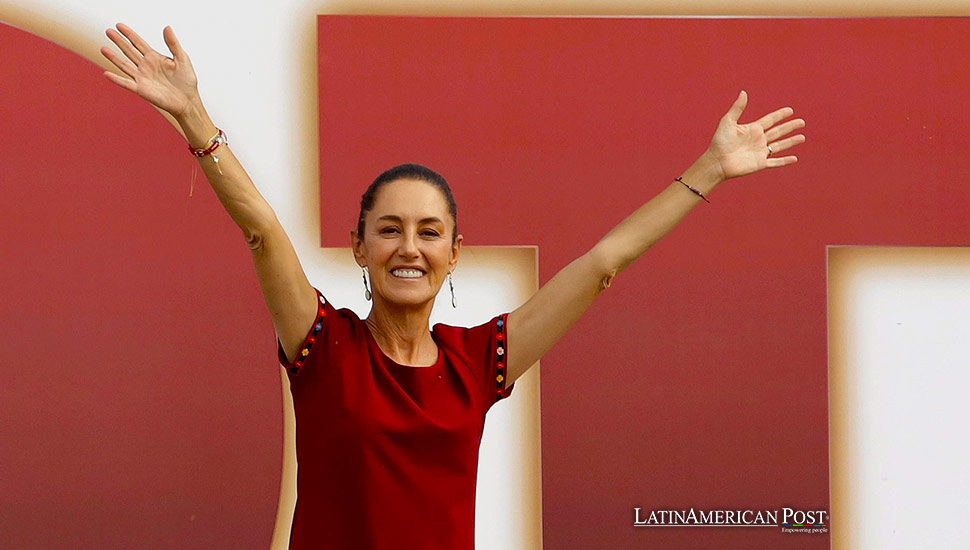Mexican Candidate Sheinbaum’s Vision for Indigenous Rights and Chiapas’ Development

Claudia Sheinbaum, the official presidential candidate, emphasizes the reform of Mexico’s Constitution to recognize the autonomy and rights of indigenous peoples while promising environmental protection and fair economic policies in Chiapas.
Amid a crowd of over 7,000 supporters, Claudia Sheinbaum, the official presidential candidate of the coalition comprising the Morena, Labor (PT), and Green Ecologist (PVEM) parties, reaffirmed her commitment to a pivotal constitutional reform. This reform ensures indigenous communities are recognized as subjects of public law, thereby acknowledging their autonomy and traditional forms of organization.
Sheinbaum’s proposed reform to Article 2 of the Mexican Constitution seeks to guarantee the rights of indigenous and Afro-Mexican communities. This initiative, first presented by President Andrés Manuel López Obrador on International Mother Language Day, aims to establish a legal framework that recognizes these communities’ public legal personality and their right to self-determination. The reform package, part of the executive proposals on February 5, underscores the importance of cultural recognition and protecting indigenous territories and natural resources.
Chiapas: A State of Cultural Richness and Conflict
Chiapas, known for its rich cultural diversity due to its substantial indigenous population, faces significant challenges. The region has been described as being in a state of ‘civil war’ by indigenous groups, particularly those aligned with the Ejército Zapatista de Liberación Nacional (EZLN). These communities have been plagued by armed conflicts, violence, and insecurity, resulting in numerous homicides, disappearances, and forced displacements.
Sheinbaum’s Commitments to Chiapas
Sheinbaum, accompanied by Chiapas gubernatorial candidate Eduardo Ramírez, laid out several critical promises for the state during her address. She pledged to launch a unique program to ensure fair prices for coffee and maize, vital crops for the local economy. Furthermore, she vowed to foster a humanistic approach to development that addresses the needs of migrants from the south.
Sheinbaum also reassured continued support for older people and youth, emphasizing improved employment opportunities, healthcare access, and availability of medicines. She countered opposition claims by asserting her administration’s commitment to truth, democracy, and the welfare of indigenous peoples.
Historical Context of Indigenous Rights in Mexico
The struggle for indigenous rights in Mexico has deep historical roots. The Mexican Constitution of 1917 made initial provisions for indigenous communities. Still, significant advancements came with the 1992 amendments, which recognized the nation’s multicultural composition and indigenous peoples’ rights. The Zapatista uprising in 1994 further highlighted the need for comprehensive reforms to address indigenous grievances.
President López Obrador’s administration has made strides in this direction, with policies aimed at elevating the socio-economic status of indigenous communities. Sheinbaum’s proposed reforms build on this legacy, seeking to embed these rights more firmly in the constitutional framework.
Addressing Environmental and Economic Challenges
Sheinbaum’s vision for Chiapas strongly focuses on environmental protection and sustainable development. She emphasized the importance of preserving the region’s jungles and recognizing indigenous communities’ rights over their territories and natural resources. This approach aligns with global trends toward environmentally sustainable policies and respect for indigenous land rights.
In addition to environmental concerns, Sheinbaum addressed economic development. She highlighted plans to establish a financial hub on Mexico’s southern border to stimulate regional growth and create new opportunities through private sector investment. This initiative aims to counteract the economic challenges exacerbated by the region’s instability and provide a sustainable path forward.
The support of coalition partners Morena, PT, and PVEM is crucial for Sheinbaum’s reform agenda. The coalition’s unified stance on indigenous rights and environmental protection reflects a broader commitment to social justice and sustainable development. However, achieving these reforms will require navigating the complexities of Mexico’s political landscape, including gaining legislative approval and addressing opposition concerns.
A Vision for the Future
Sheinbaum’s campaign message resonated with the diverse audience gathered from Chiapas’ 124 municipalities. She emphasized that the upcoming elections are critical for defining the nation’s future and expressed confidence in the coalition’s ability to deliver meaningful change. Her vision for Chiapas and Mexico is rooted in a commitment to humanism, social equity, and environmental stewardship.
Also read: Diplomatic Standoff: ICJ Denies Mexico’s Request to Protect Embassy
Claudia Sheinbaum’s proposed constitutional reforms and development plans represent a significant step towards addressing historical injustices and fostering sustainable growth in Chiapas. By recognizing the autonomy and rights of indigenous communities and prioritizing environmental protection and economic fairness, Sheinbaum aims to build a more inclusive and equitable future for Mexico. The success of these initiatives will depend on broad political support and effective implementation, marking a potential turning point in the country’s approach to indigenous rights and regional development.




